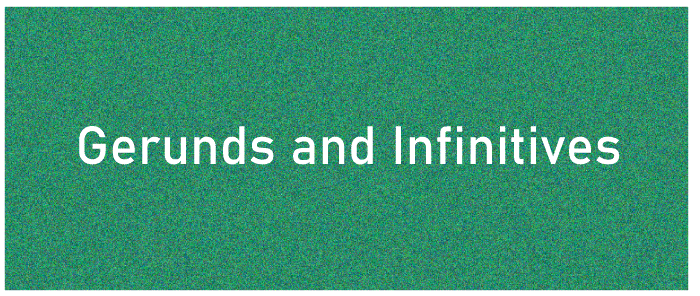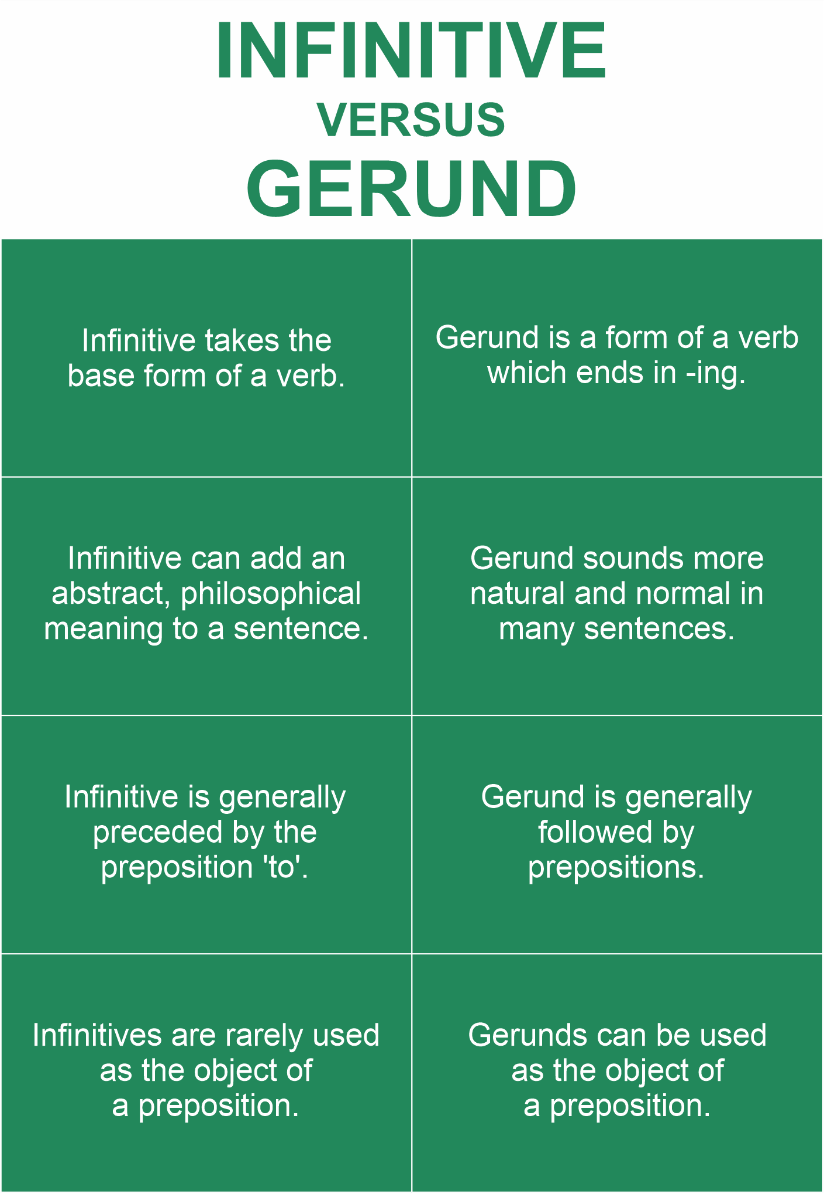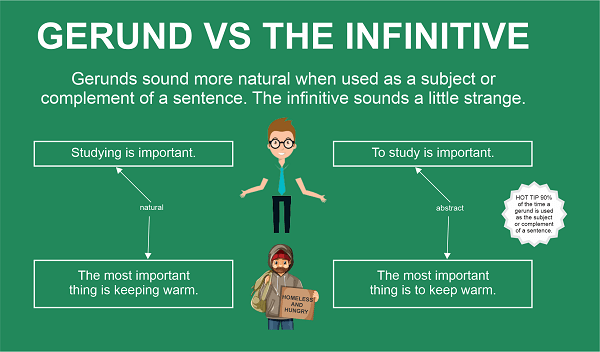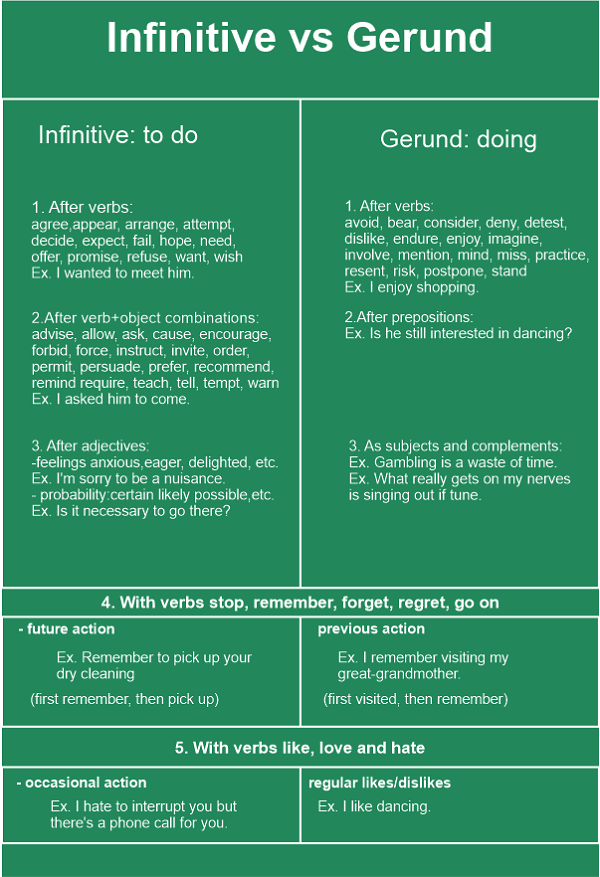Gerunds and InfinitivesGerunds and infinitives are frequently used in the English language. Gerunds and infinitives are often known as verb complements. They can be either subjects or objects in a statement. 
What Exactly are Gerunds?A gerund are verbs in their ing (present participle) format that serves as a noun, referring to an activity instead of an individual or object. A gerund can be formed from any action verb. What Exactly are Infinitives?The infinitives in English Grammar comprise of "to + verb" and can be utilized as a subject or object in a statement, but the latter is far less common. But how does one know when they must use an infinitive and when they should use a gerund? The five easy rules listed below will undoubtedly assist! An infinitive is a verb format that begins with "to." For instance, "to do," "to rest," "to enjoy," and "to make." The most basic verb form must be modified to fit into sentences. "She rests," for instance, no longer includes the infinitive of the verb "to rest." Rather it has been changed into the simple present third person form of the verb "to rest": rests. Infinitives are simple! How about Gerunds?Gerunds are another option. Gerunds are created by appending "-ing" to a verb, such as "sitting," "painting," or "fishing." They are not, however, the "-ing" verb forms found in the present or past continuous tense. Gerunds and nouns appear identical. However, they are the verb forms that are utilized as nouns. Consider the infinitive of the verb "to rest" in two different sentences: I am resting. This is the present continuous. "Resting" is a component of the verb here. This isn't a gerund. The second statement is as follows: I dislike resting. This is a present simple sentence with a gerund. This sentence's direct object is "resting." Now that you understand the distinction between infinitives and gerunds let's go over the guidelines for using both appropriately. While the principles below will help you learn how to utilize infinitives and gerunds, you must practice them so you can employ them in everyday life. 
5 Simple Rules for Using Gerunds and InfinitivesRule 1: Gerunds can be utilized as sentence subjects. Consider the following examples.
The gerunds are the sentence subjects in this case ("exercising," "making buddies," "becoming a multi-millionaire"). All three sentences sound like classic English sentences. Now read the following two sentences: "The question is whether to be or not to be." "To grieve a mischief that has passed and gone is the next method to attract new mischief." Do they not sound formal? They're quite poetic, aren't they? Shakespeare is widely regarded as one of the finest writers of all time, however his English is notoriously tough to comprehend. This is due to the fact that it is literature. It is both formal and artistic. The sentence subjects in those two quotes are the infinitives "to be" and "to lament." So, while both infinitives and gerunds can be used as subjects, gerunds are far more usually used as subjects. Simply consider how your choice affects the tone and meaning of your phrases. Rule 2: Gerunds and infinitives can both be used as sentence objects. You could say : "I enjoy doodling. " You might also say : "Yesterday, I decided to doodle. " Both sentences are grammatical. However, one contains an infinitive as the object, and the other contains a gerund. What is the distinction? It is the verbs that appear before the object! Some verbs need a gerund, whereas others require an infinitive. The formula is "enjoy" + [gerund] and "decide" + [infinitive] in the instances above. With experience, you'll be able to tell which is which. Following are some instances of verbs that must be accompanied by an infinitive: Agree: I agreed to attend a party with a colleague. Decide: The chairman did not take part in the conversations. Deserve: Each one deserves to be valued. Expect: I expect to receive my test grade by Monday. Hope: People were hoping to avoid traffic by leaving earlier. Learn: He learned not to put his trust in anybody. Need: She needs cooking instruction. Offer: I offered to assist my brother with his schoolwork. Plan: Kids are planning to go to a mall tonight. Promise: My buddy promised to make time to assist me with my move. Seem: We seem to be confused. Wait: I can't wait to visit my relatives. Want: I don't want to go to rest just yet. There are many verbs that necessitate an infinitive following them. As you grow in your English education, you will naturally learn them. Here are some other verbs that must be accompanied by a gerund: Let us look at some of the examples ;
Rule 3 Infinitives must be used after many adjectives. Here are three examples of statements to demonstrate this rule :
When you use an adjective to describe something (like in the instances above), an infinitive must follow (in bold). Gerunds would be wrong here. But keep in mind! If you want to turn that object into a subject (see Rule 1), use a gerund:
How else can you determine whether an infinitive must accompany an adjective? Another approach to indicate is to use the phrase "too + [adjective]"! As an example:
The same holds true for "[adjective] + enough" :
Only infinitives are often used after specific verbs that are accompanied by nouns or pronouns that refer to an individual. "We requested him not to do it. " "We" is the subject of this statement, "requested" is the verb, and "him" is the objective type of the pronoun "he." After specific verbs are accompanied by nouns or pronouns pertaining to individuals, one must use an infinitive ("to go"), never a gerund. To recall this rule, study verbs in this circumstance that employ an object and an infinitive. 

Begin with the following examples. The objects are highlighted (nouns and pronouns). Take note of how all of the underlined objects are accompanied by infinitives.
Rule 5: Only gerunds are used following prepositions, according to. (with one exception). Consider the following sentence : I convinced him of taking on that task. The gerund "taking" comes after the preposition "of." Prepositions can come after any word, whether it's a noun, pronoun, verb, or adjective. The prepositions are highlighted in the instances below, accompanied by the gerunds in bold. A preposition that comes after a noun :
A preposition that comes after a pronoun : I appreciate you for not being dishonest. A preposition that comes after a verb :
A preposition that comes after an adjective :
One exception exists. Fortunately, it should be simple to remember! The one exception "But" is a brief word that connects two clauses in a statement. It's known as a conjunction. "But" can also function as a preposition at times. When utilized as a preposition, "but" has the same connotation as "except." When using "but" or "except," they must be accompanied by an infinitive :
This is not a common use of "but" and "except." Just remember to use gerunds after prepositions, and you'll be fine most of the time! We utilize gerunds (verb + ing) : After specific verbs - I enjoy swimming. After prepositions - He drank a cup of tea before going. As the subject or object of a sentence - Running is a great activity. We use 'to' + infinitive : After specific verbs - We planned to go. After many adjectives - It's tough to get up so early. To show purpose - I came to the USA to learn Journalism. We utilize the bare infinitive (the infinitive without 'to') : Post modal verbs - He can see you at five o'clock. Post 'let', 'make', and (sometimes) 'help' - The educator let him leave early. After certain verbs of perception like (see, watch, hear, notice, feel, and sense) - I noticed her crawl away. After expressions with 'why' - why go out the evening before a test ? Examples of GerundsWhen employed as a subject, gerunds might appear at the start of a sentence :
Gerunds can function as an object after a verb :
Gerunds can be used as an object following a preposition :
Gerunds are subject to the same spelling requirements as the progressive tenses. Some verbs and verb phrases are quickly followed by a gerund: Peter avoids using pesticides on the veggies he plants. A gerund or infinitive can accompany some verbs without changing their meaning:
Now let us look at some examples of Infinitives. The infinitives are the verb forms that serve as a substitute for other parts of speech in a phrase. It is made up of to +, the verb's base form. To buy, for example. Examples of InfinitivesInfinitives can be utilized as follows : An object that comes after the verb : James always forgets to cook. A subject at the beginning of a sentence : To roam around the world takes a ton of time and resources. An adverb that modifies a verb : You vowed to get me a diamond bracelet. An adjective that modifies a noun : Tara has the potential to succeed. An infinitive quickly follows some verbs : Do you wish to contact your family right now ? Some verbs are accompanied first by a noun or pronoun and subsequently by an infinitive :
An infinitive or a gerund can accompany some verbs without the meaning changing :
An infinitive or gerund can follow some verbs, but the meaning changes :
ConclusionGerunds and infinitives may be perplexing, but they provide variety and color to your English-speaking. The more you recognize/ identify the gerunds and infinitives in your English language studies, the easier it will become! It is quite beneficial to study and practice utilizing them appropriately. You may sometimes be unclear about whether to use an infinitive or a gerund in a sentence. Try modifying the statement and conveying what you want to communicate in a different way in this case. You can improve your fluency by practicing. It is essential to practice.
Next Topic50 Examples Of Gerunds
|
 For Videos Join Our Youtube Channel: Join Now
For Videos Join Our Youtube Channel: Join Now
Feedback
- Send your Feedback to [email protected]
Help Others, Please Share










